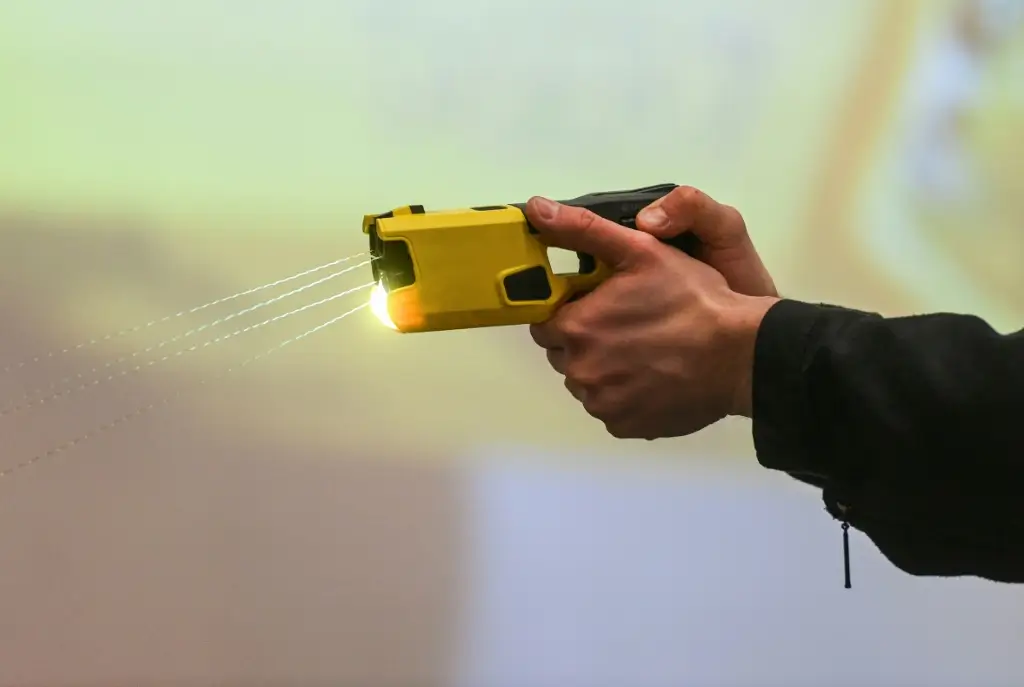
The federal government wants to authorize the widespread use of stun guns by the federal police. On Wednesday, the cabinet approved a corresponding bill from the Federal Ministry of the Interior. The so-called Tasers can be an effective or health-friendly alternative to firearms in certain police situations. "The Taser represents modern security policy; it protects the police and has a de-escalating effect in dangerous situations," said Interior Minister Alexander Dobrindt (CSU).
The resolution envisages a "comprehensive" introduction in the coming years. The draft law emphasizes that police officers should have "all operational and command resources" at their disposal "in order to be able to act effectively and at the same time proportionately." The use of firearms is "always a last resort." Tasers, however, could be used to ensure "the most graduated approach possible."
Tasers are clearly distinguishable from police pistols by their yellow signal color. They fire wires containing arrow-shaped projectiles from a distance of several meters. These projectiles become embedded in the skin and deliver brief, painful electric shocks that attack the nervous system of the victim, immediately incapacitating them for several seconds – usually, and unlike firearms, without significant after-effects. This is intended to prevent the use of pistols.
The Federal Police have been testing various Taser models in practice since 2020. "Around 200 specially trained officers have carried the devices on over 40,000 missions," the Federal Ministry of the Interior announced. "Use was threatened in 132 cases, and actually used in 16 cases." Based on these experiences, the Taser is considered an "effective addition to the catalog of operational resources."
The amendment to the law is intended to create legal certainty for widespread use by legally defining "distance electroshock devices" as permitted weapons alongside "cutting and firearms." Tasers now rank between traditional batons, pepper sprays, and service pistols, Dobrindt said.
According to Dobrindt, Tasers can be used in dangerous situations for officers, for example, when attackers armed with a blunt or stabbing weapon need to be kept at a distance. The German Police Union (GdP) had already welcomed Dobrindt's initiative. The German Police Union (DPolG) also emphasized that the Taser could fill the gap between batons and firearms, thus saving lives.
In the United States, stun guns have been in use for a long time. In Germany, they have been used by police officers on regular patrol duty for several years in what are now ten federal states. However, some states continue to oppose their introduction, citing the disadvantages of stun guns.
Critics consider the health risks too high for people with cardiovascular diseases, for example, and the same could apply to people under the influence of drugs. Skeptics also argue that choosing the appropriate means of deployment in dangerous situations could lead to additional stress for police officers.
However, Dobrindt emphasized on Wednesday that the introduction of Tasers had been strongly demanded, particularly from police ranks. He also pointed to the "high de-escalating effect" of the devices, the threat of which alone often calms attackers down.
The nationwide rollout is scheduled to begin this year. He anticipates "a magnitude of 10,000 devices" will be needed in the coming years, the minister said. Five million euros have been earmarked for this in the budget this year alone, with similar annual amounts in the coming years. The Bundestag still has to approve the law, but the Bundesrat has not.